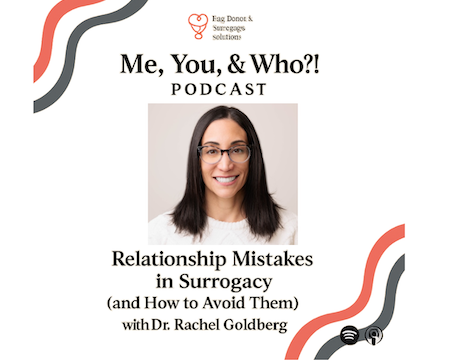How to Build Resilience During Fertility Treatment (as featured on The Egg Whisperer Show)
In this episode we cover:
Common emotional challenges people face during fertility treatment
How fertility treatment affects relationships with partners and oneself
Coping strategies for managing stress and anxiety
Prioritizing mental health while staying focused on treatment goals
When to seek support from a mental health professional
How Much Can You Get Paid for Donating Eggs?
Egg donors in the U.S. typically earn $10,000 to $50,000 per cycle, depending on the type of donation they choose. Rachel Goldberg, an infertility counselor in Los Angeles, told GoodRx Health that compensation varies
The Unspoken Mental Toll of IVF
Many women will often feel isolated as they struggle with the emotional and physical demands of the process,” Goldberg says. “The disruption to their daily lives — both socially and professionally — further exacerbates feelings of despair.”
Increase a baby’s IQ 6+ points by… testing the embryo?
“Will screening expand to everything from IQ to hair color and body shape and size? It would likely increase socioeconomic disparities and expand discrimination. After decades of working toward equality, this could reverse the progress that has been made by reinforcing superiority and inferiority complexes.”
Third Party Reproduction (Just Don’t Eff Them Up Podcast)
The basics of third-party reproduction - using donor eggs, sperm, embryos or using a surrogate
Hope and Heartache: Managing the Mental Strain of Infertility (Fertility Bestie Podcast)
Rachel sheds light on how the emotional toll of infertility can manifest in unexpected ways. She also provides real-world advice on how to cope with the infamous two-week wait, the constant rollercoaster of emotions, and the anxiety and depression that many face during this journey.
Navigating the Emotional Landscape of Surrogacy (The Surrogacy Scoop Podcast)
On today's episode of The Surrogacy Scoop, we sit down with Rachel Goldberg, Licensed Marriage & Family, and Perinatal Mental Health Certified Therapist. Rachel explores all the unexpected factors that come with surrogacy from the intented parents side, surrogate, and agency perspective, and gives real examples of how she navigated unique surrogacy related challenges.
Cardi B Defends Her Postpartum Workout 8 Days After Giving Birth—But Is It Safe?
To be fair, as Goldberg explains, “In Cardi B's case, the pressure she faces to ‘bounce back’ is likely intensified by the frequent public commentary about her appearance. This likely leads her to feel the need to prove she's taking control of her body.”
How to Support a Friend after a Miscarriage
According to Rachel Goldberg, LMFT, PMH-C, a licensed marriage and family therapist, if a friend has gone through a miscarriage, the best response is simply to say you’re sorry. She advises, "Just saying you’re sorry is sufficient unless they want to share more.” While it might feel awkward to remain silent after saying ‘I’m sorry,’ it’s often better than risking saying something that could hurt them further.
‘Frustrated With the Pain’: The Untold Challenges of Breast Pumping
Choosing the right flange size and right kind of pump is an integral part of having a successful pumping experience, Goldberg says, but there’s often a lack of information on what pump makes sense for different people.
How to Handle Infertility or Not Being Able to Have Kids of Your Own
According to Goldberg, men often cope by internalizing their feelings or adopting a more solution-focused approach, whereas women tend to be more emotion-driven and interested in talking about it often.
Podcast: The Impact of Eating Disorders on Reproductive Health with Rachel Goldberg LMFT, PMH
On this episode of Talking Away The Taboo, Rachel Goldberg LMFT, PMH joins Aimee Baron, MD to talk about: 1) binge and restrictive eating habits and how that can affect fertility 2) the reasons why disordered eating or exercise can cause fertility issues 3) the guilt and shame that go along with this these diagnoses 4) the small changes suggestions people can make to try to get them out of a destructive feeding pattern 5) her thoughts on ozempic and other meds that have been linked to increased fertility success and how that plays a role in someone’s habits
NEWS‘Deeply concerning’: experts react to ‘shocking’ women’s health report
“Disparities in maternal mental healthcare have been an ongoing issue. The report emphasizes that mental health is the number one risk factor, yet for many, it is neither accessible nor easy to navigate,”















